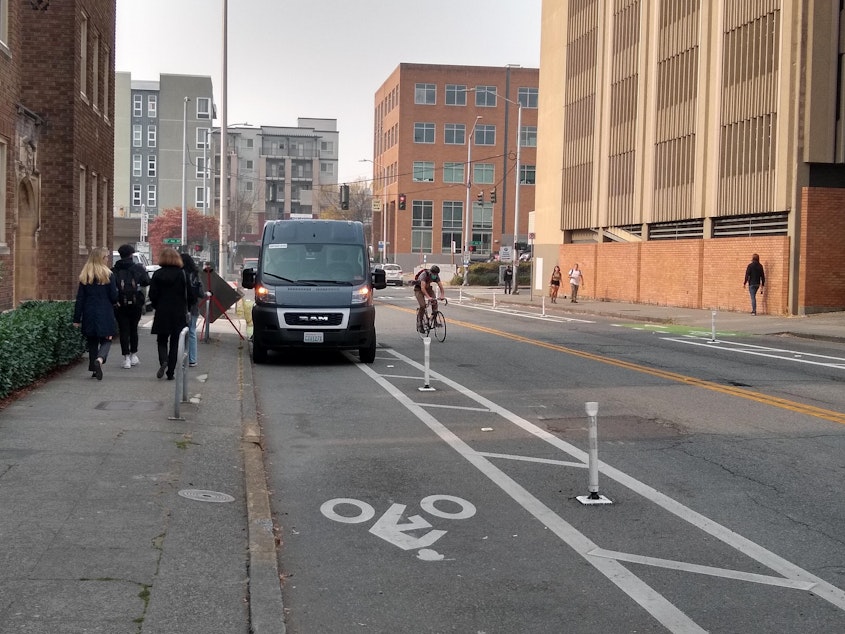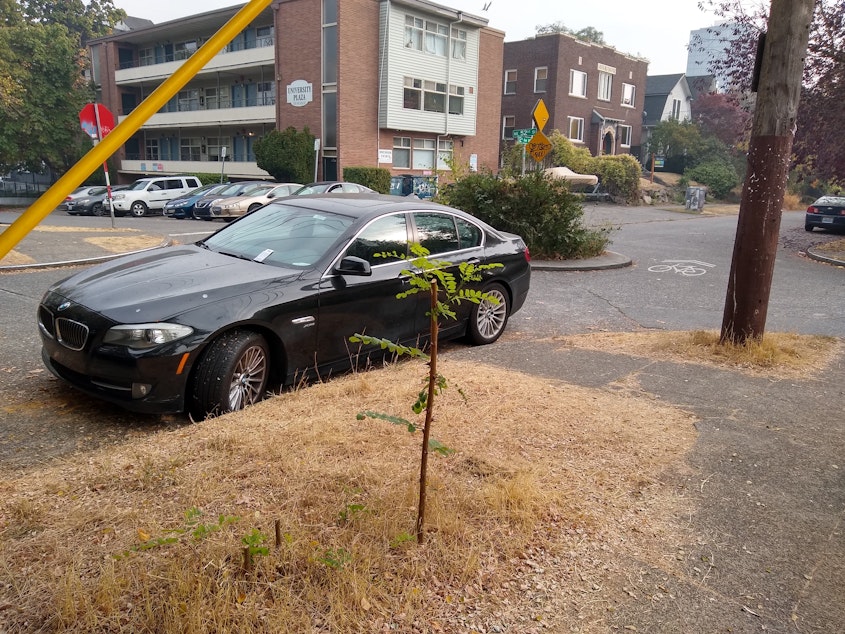Activists call mayor's plan to return parking enforcement to police a 'huge betrayal'

When racial justice protestors called for cuts to the Seattle Police Department in the summer of 2020, the City Council responded by moving parking enforcement officers to the transportation department. The shift began in 2021 and did not go smoothly.
The general idea was to improve public safety, on two fronts. This change would reduce interactions between Seattle residents and law enforcement, which advocates point out can lead to conflict and inequitable treatment.
Another goal was to streamline communication between the officers who issue parking tickets and the transportation division tasked with fixing hazardous parking areas, such as streets that need a three-minute drop-off zone or clearer signage to mark where it's legal to park.
Now, less than a year later, Mayor Bruce Harrell wants to undo that move and put parking enforcement back under the police department. He says doing so will save the city millions of dollars in overhead and will improve parking enforcement officers’ morale. However, city council staff said in a recent budget meeting that the cost is the same regardless of which department handles parking enforcement.
Racial justice activists and advocates for pedestrian and bike safety have banded together to fight the mayor’s proposal.
“It’s a huge betrayal,” said Trae Thompson-Wiley, a community organizer with Creative Justice who spent the summer of 2020 organizing weekly protests. “Something that impacts us every day doesn’t mean as much to the mayor’s office.”
Sponsored
“We wanted a civilian-centered approach to this,” Thompson-Wiley said. “With parking enforcement being with the Seattle Police Department, we know that the Black and Brown communities, especially, and Indigenous communities are more harmed by policing.”
Thompson-Wiley and other activists viewed the parking enforcement move as part of a broader, long-term effort to scale back policing, including in traffic enforcement and response to mental health crises.
Parking enforcement in Seattle was already done by non-sworn, unarmed civilians, but activists say it still should make a difference to move them out of the police department.
“It’s not necessary for [parking enforcement] to be done by people with an enforcement or punishment mindset,” said Clara Cantor, with Seattle Neighborhood Greenways and Whose Streets Our Streets, an all-BIPOC group dedicated to re-envisioning safety in streets and public spaces.
It “could be done significantly better by someone who doesn’t have that mindset, who’s thinking more about public safety or curb space management,” Cantor said.
Sponsored

Cantor ticked off a list of safety hazards that illegal parking can cause: Cars blocking curb ramps force people in wheelchairs to use detours outside of crosswalks. Delivery trucks and ride-share vehicles parked in bike lanes force bike commuters to merge with traffic. When cars park too close to intersections, people who want to cross the street have to edge off the curb to see if it’s safe.
The situations are “very, very common,” Cantor said. There’s even a whole Twitter account dedicated to photos of cars blocking bike lanes in Seattle, with several new posts every day.
Writing parking tickets won’t solve these problems, Cantor said.
Sponsored
“The way to solve that is to make an actual change to the street,” she said.
But the changes activists envisioned when they asked for parking enforcement to be moved out of the police department were never made.
“The bulk of things associated with our unit are still housed within SPD,” said Chrisanne Sapp, president of the Parking Enforcement Officers Guild. “We still work out of SPD facilities. We still drive cars and scooters that say Seattle Police Department. Our uniforms still say police.”
The mayor’s office confirmed there was no difference in enforcement priorities between this year and previous years, and there is currently no tracking of where frequent parking violations occur, which could help identify possible fixes at the street level.
In 2020, the Parking Enforcement Officers Guild lobbied to move to a newly-created civilian safety department, but they were instead moved to the transportation department. Sapp said they're not happy there, and Harrell's office seems poised to honor the officers' preference.
Sponsored
“First and foremost, this move responds to the wishes of our employees and their labor representatives, who have expressed their preference for being housed in the Seattle Police Department,” Jamie Housen, a spokesperson for the mayor, wrote in an email.
“It’s no secret that we did not believe that SDOT [the Department of Transportation] was the right place for us,” Chrisanne Sapp, the parking enforcement officer, said. “We are an enforcement arm. We are non-sworn civilian employees, but we do go out and issue citations based on the Seattle Municipal Code.”
It’s a question of identity, she said.
“We as a group view ourselves as working in support of and in conjunction with the officers in the Seattle Police Department," Sapp said. "And we would like to continue that moving forward.”
She also said that, when parking enforcement officers are housed within the police department, they’re able to access information about vehicle owners’ history, including aggression toward law enforcement, and whether vehicle tabs were paid but not yet affixed to the vehicle. She said that information makes it easier and safer for parking enforcement officers to do their job.
Sponsored
In a recent budget meeting, Seattle City Councilmember Teresa Mosqueda asked if there was a way to resolve some of parking enforcement officers’ concerns — such as granting them access to information about stolen vehicles and hostile individuals — without moving them back to the police department.
She also questioned why the transfer was so bumpy and incomplete in the first place.
“This is not directed at the current administration, because I think you've all been trying to identify where there's been challenges with implementation since you've arrived, but why were these individuals never offered a uniform or badge that did not say SPD?” Mosqueda asked. “I think that's problematic, if our entire effort was to try to reduce what people perceive to be additional police presence due to parking enforcement officers being in neighborhoods.”
Changing the core mission of parking enforcement from a punishment model to a focus on safety, and a corresponding shift in parking enforcement officers’ identities, is exactly what proponents of the change had in mind, Trae Thompson-Wiley said.
“The biggest thing they have to do is making sure that everything is transferred over — that it’s a full shift,” she said.
A year was too short a time for this experiment, Clara Cantor said.
“Culture shift takes a bit longer than that,” she said.
The City Council plans to vote on the final budget Nov. 21 and 22.
Correction: An earlier version of this story inaccurately stated that the parking enforcement officers never wanted out of SPD.




